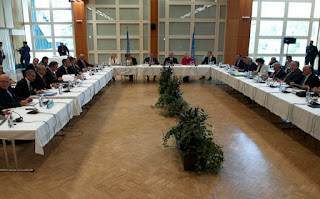Erdogan's Silent Democratization Package
The Democratization Package that
was made public by Turkish Prime Minister Rexhep Tayyip Erdogan on 30 September
leaves much to be desired although it could be described as a small step forward.
In today’s polarized political
climate, anything the government promotes is viewed with much suspicion in
particular in light of the upcoming electoral season beginning next year with local
elections in March, the presidential election in August and the general
election in 2015. In true autocratic Turkish political tradition, which Erdogan
usually decries, the package was decided in back rooms among a small cadre of apparatchiks
and unveiled to the rest of us. Obviously, it caters to the
conservative-nationalist sensitivities of the Prime Minister’s electoral base in
particular with regard to allowing women to wear head scarves in public places
(though not everywhere) and token reforms for minorities. Most importantly and
ominously, it sets the stage for widespread gerrymandering with a view to the
forthcoming elections. The three possible options presented by Erdogan – maintaining
the 10% threshold; lowering it to 7%; and a majoritarian system which would
eliminate the threshold – all imply that the government will seek to maintain
its aura of electoral invincibility by all means possible.
The Kurds, the Alevis, and the
Ecumenical Patriarchate and the Greek Rum community it represents must feel
terribly deceived as the expectations which were cultivated by the government have
not been met. While the Turkish alphabet has now grown by three letters,
Kurdish can only be taught in private schools and political parties polling
over 3% can receive state financial assistance; these measures might co-opt
somewhat parts of the Kurdish community but the constitutional change needed to
allow education in Kurdish in state institutions is nowhere in sight. While a
university will be renamed after a prominent Alevi spiritual leader, the Alevi
houses of prayer and their religious leaders are still not officially recognized.
While the legal impediments to the return of the assets of minority foundations
will be removed; the Halki Seminary remains closed. The EU must also feel frustrated
as many of the demands of the minorities are prominently mentioned in its Turkey
annual progress reports. This also applies to a number of other concerns that
the democratization does not address. As a result, EU officials refer to the
package as worthy of ‘modest progress.’
To some extent the problem stems
from the fact that the process to define a new ‘democratic’ Constitution for
Turkey has stalled in part because of splits within the opposition CHP party regarding
some of the proposed reforms. Consequently, the democratization package only tackles
what is doable at this stage and, most importantly, in the interest of the AKP
which seeks to maintain if not augment its electoral base. The debate between
majoritarian versus pluralist democracy that was in evidence during the Gezi
protests is very much reflected here. For now, Erdogan’s ‘silent revolution’ is
too silent to make a significant impact on democratic and pluralistic societal transformation.



Comments